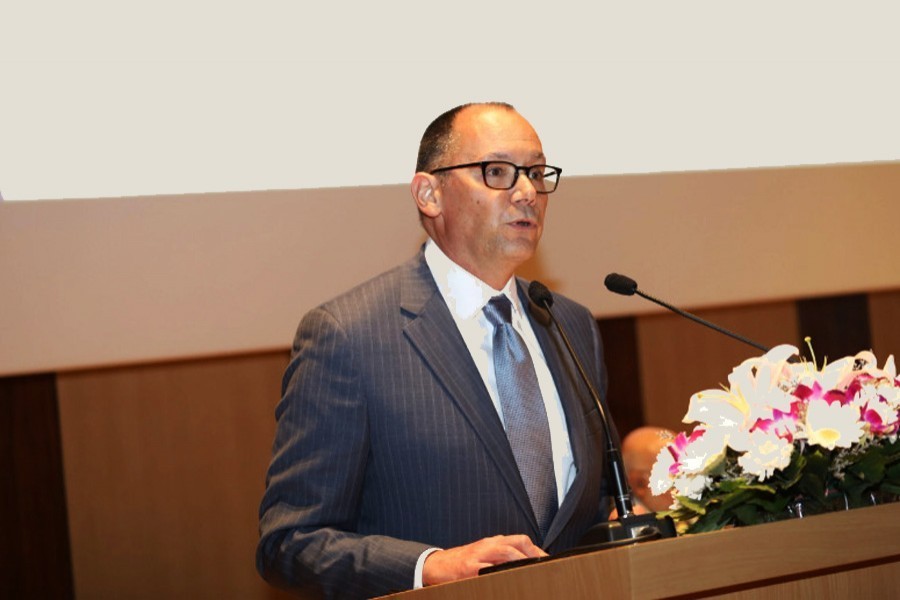
Published :
Updated :

US Ambassador in Dhaka Peter Haas on Thursday said that importing oil from Russia is not under sanction.
Addressing a “Meet the press” programme, organised by a local think tank, the US ambassador also noted that sanctions on the RAB imposed by the US administration will continue until accountability is ensured and reformation is made in the organisation.
During the two hours long interaction, the US ambassador talked about issues related to the next general elections, trade and investment, Rohingya crisis, and the impact of Ukraine war on the global supply chain.
Responding to a question regarding India and its purchase of energy from Russia, he said, “One of the things that I think was a common misperception is that the imposed sanctions include oil, gas, fertiliser, and agricultural products. They don't. That's not part of the sanctions that were imposed by the United States and others in the international community. So it is not a sanctionable activity”.
“We're also cognisant of the fact that because of the supply chain issues caused by Russia's invasion of Ukraine, there are shortages in energy and that the prices have gone up.”
“What we do hope is that they move to other sources of energy and other products from countries that don't invade their neighbours” the envoy explained.
On the issue of resumption of GSP facility for Bangladesh he said, the US continues to have conversations with the Government of Bangladesh.
“We continue to acknowledge where the progress has been made. We will be having more conversations in October about the remaining areas where we would like to see progress”, he added.
Tagging fair elections with investment be said, there's no place in the world where political violence actually helps create a better environment for elections.
Stressing the need for monitoring the preparations run-up to general elections he said, “I think the entire world will be watching these elections. The entire world will be looking to see if they are free and fair and held to an international standard. So I think that's critical for the day of elections”.
However, he mentioned that the preparations running up to Election Day are also critical.
Regarding the allegations of enforced disappearances, he said, “I don't it's any secret that we're concerned about it from our annual Human Rights Report. And incidentally, if you look at our annual Human Rights Report over the past number of years, I haven't gone back all the way to the beginning. We've had these concerns for a very, very long time here in Bangladesh and that we have pushed on these things”
Suggesting a proper probe into these incidents he said, “We remain very concerned. We look at all of the cases we see the calls from the UN and others for independent investigations. These are really concerning to us, and particularly with the backdrop of the upcoming national elections of ensuring that the people of Bangladesh have the ability to choose their leaders”.
Asked whether the US look Bangladesh through India’s prism, he said, “I don't think I mentioned the word India a single time. I don't know for sure. But I think if you look at our integrated country strategy, you will not see the word India in there. My job is to promote US-Bangladesh relations. The eighth most populous country in the world, one of the fastest growing economies there is that which plays has an important strategic position and a hugely important region”.
Asked about US steps against Myanmar for violations of human rights he said, the US has imposed lots of sanctions on Burmese military leaders.
“Lots of sanctions, we continue to impose sanctions. We continue to pursue them for corruption for human rights abuses. And to say that we're not is not factually correct”
About the Indo-Pacific initiatives and Bangladesh’s involvement in it he said, visions of a free and open and resilient and interconnected Indo-Pacific where each country can make its own decisions without coercion is important.
“I think a lot more of the emphasis has been on the security-related aspects of that rather than the economy. We've been talking with the Government of Bangladesh about the Indo Pacific economic framework since March. I think it's important to know that, that this framework is very different”.
“And some people criticise the fact that it's not about tariffs and reducing trade barriers. In that sense, I say that's a good thing. Because that's not really where the economy of the 21st century is. The Indo Pacific economic framework is about negotiating things on digital economy, clean energy and fighting corruption. These are really the key challenges”.
On Rohingya crisis, the envoy said, “Ultimately this is just saying this is all Burma's fault. They're the ones who created this situation. They're the ones who committed genocide. They're the ones who are responsible for changing the situation and resolving it.”
“That said, they don't seem to be moving very quickly. And so it does require an integrated international strategy and response. I think the United States has played a leadership role on this in the UN.”
He also pointed out that the US has imposed sanctions on junto leaders and has encouraged ASEAN countries to step up and apply pressure.
Expressing US willingness to resettle some Rohingyas he said, “We recently announced that President Biden just announced this week that the United States will welcome up to 125,000 refugees and asylum seekers in the next year”.
“It is something that we're working with, with UNHCR on about how to do resettlement. We've resettled almost 10,000 Rohingya over the past couple of decades, largely from Malaysia and Thailand. But it's something that we're looking to again as part of an overall approach to dealing with the crisis”.
Centre for Governance Studies organised the programme moderated by Zillur Rahman.
mirmostafiz@yahoo.com


 For all latest news, follow The Financial Express Google News channel.
For all latest news, follow The Financial Express Google News channel.